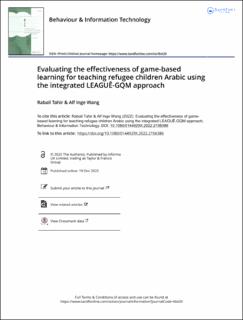| dc.contributor.author | Tahir, Rabail | |
| dc.contributor.author | Wang, Alf Inge | |
| dc.date.accessioned | 2023-02-20T11:58:07Z | |
| dc.date.available | 2023-02-20T11:58:07Z | |
| dc.date.created | 2022-12-21T11:57:57Z | |
| dc.date.issued | 2022 | |
| dc.identifier.citation | Behaviour and Information Technology. 2022, 1-29. | en_US |
| dc.identifier.issn | 0144-929X | |
| dc.identifier.uri | https://hdl.handle.net/11250/3052327 | |
| dc.description.abstract | Game-based learning (GBL) is widely utilised in various domains and continues to receive interest and attention from researchers and practitioners alike. However, there is still a lack of empirical evidence concerning its effectiveness, making GBL evaluation a critical undertaking. This paper proposes an integrated approach for planning and executing GBL evaluation studies and presents its application by evaluating the effectiveness of a GBL approach to improve the Arabic reading skills of migrant refugee children in an informal learning setup. The study focuses on how children’s age group, learning modality preference, and prior mobile experience affect their learning, usability, and gameplay performance. A quasi-experiment with a one-group pretest-posttest design was conducted with 30 children (5–10 years old) from migrant refugee backgrounds. The results show a statistically significant improvement in their reading assessment score. The results also outline a clear impact of children’s age groups on their learning gain, usability score, and total levels played. Moreover, learning modality preference and prior mobile experience both had a statistically significant effect related to usability and gameplay performance parameters. However, no effect was found on learning gain. Based on the findings, some design recommendations are suggested for more inclusive design focusing on user characteristics. | en_US |
| dc.description.abstract | Evaluating the effectiveness of game-based learning for teaching refugee children Arabic using the integrated LEAGUÊ-GQM approach | en_US |
| dc.language.iso | eng | en_US |
| dc.publisher | Taylor & Francis | en_US |
| dc.relation.uri | https://www.tandfonline.com/doi/full/10.1080/0144929X.2022.2156386 | |
| dc.rights | Navngivelse 4.0 Internasjonal | * |
| dc.rights.uri | http://creativecommons.org/licenses/by/4.0/deed.no | * |
| dc.subject | Spillbasert læring | en_US |
| dc.subject | Game based learning | en_US |
| dc.title | Evaluating the effectiveness of game-based learning for teaching refugee children Arabic using the integrated LEAGUÊ-GQM approach | en_US |
| dc.title.alternative | Evaluating the effectiveness of game-based learning for teaching refugee children Arabic using the integrated LEAGUÊ-GQM approach | en_US |
| dc.type | Peer reviewed | en_US |
| dc.type | Journal article | en_US |
| dc.description.version | publishedVersion | en_US |
| dc.subject.nsi | VDP::Datateknologi: 551 | en_US |
| dc.subject.nsi | VDP::Computer technology: 551 | en_US |
| dc.source.pagenumber | 1-29 | en_US |
| dc.source.journal | Behaviour and Information Technology | en_US |
| dc.identifier.doi | 10.1080/0144929X.2022.2156386 | |
| dc.identifier.cristin | 2096266 | |
| cristin.ispublished | true | |
| cristin.fulltext | original | |
| cristin.qualitycode | 1 | |

